Foods That Trigger Inflammation Even If They’re Labeled Organic
Chronic inflammation is estimated to affect more than 50 million Americans, contributing to conditions such as arthritis, diabetes, and heart disease (CDC). The immune system’s response to inflammatory triggers can lead to long-term health issues, even when individuals strive to eat healthy. While organic foods are often perceived as safer and cleaner, they can still contain ingredients that spark inflammation. Identifying these hidden offenders is challenging, requiring a deeper understanding beyond organic labels. This article explores which foods, despite being organic, can still trigger inflammation and undermine your well-being.
1. Organic Wheat Bread

Organic wheat bread is often chosen for its lack of pesticides and artificial additives, but it remains a potential trigger for inflammation. The primary concern is gluten, a protein found in wheat, which can provoke an immune response not only in people with celiac disease but also in those with non-celiac gluten sensitivity (NIH). Both organic and conventional wheat contain similar levels of gluten and other proteins, such as amylase-trypsin inhibitors, which have been linked to increased inflammation in the gut.
While organic wheat bread avoids synthetic chemicals, its molecular makeup does not differ substantially from conventional wheat bread in terms of inflammatory potential. For individuals who experience joint pain, digestive discomfort, or brain fog after consuming wheat products, it is important to monitor symptoms regardless of organic labeling. Keeping a food diary and working with a healthcare provider can help identify whether wheat-based products are contributing to chronic inflammation. If symptoms persist, consider alternatives such as gluten-free or ancient grain breads, and always check ingredient labels for hidden sources of wheat. For more information, visit the Celiac Disease Foundation.
2. Organic Cow’s Milk

Organic cow’s milk is often viewed as a wholesome and natural beverage, but it can still contribute to inflammation for many individuals. The two main culprits are casein, a protein, and lactose, a natural sugar. Casein has been shown to provoke an immune response in people with dairy sensitivity, leading to symptoms such as bloating, joint pain, and skin irritation. Even without synthetic hormones or antibiotics, organic milk contains the same casein proteins as conventional milk, which can affect susceptible individuals (NIH).
Lactose intolerance, which affects roughly 68% of the global population, occurs when the body lacks enough lactase enzyme to digest lactose, resulting in gastrointestinal discomfort and, in some cases, low-grade inflammation (NIH). The organic label does not alter the lactose content, so switching to organic milk does not necessarily reduce symptoms for those who are intolerant or sensitive. If you notice persistent bloating, fatigue, or other inflammatory symptoms after consuming organic milk, consider plant-based alternatives like almond, oat, or coconut milk. Monitoring your body’s response and consulting with a healthcare professional can help determine if dairy is a hidden source of inflammation.
3. Organic Yogurt with Added Sugar
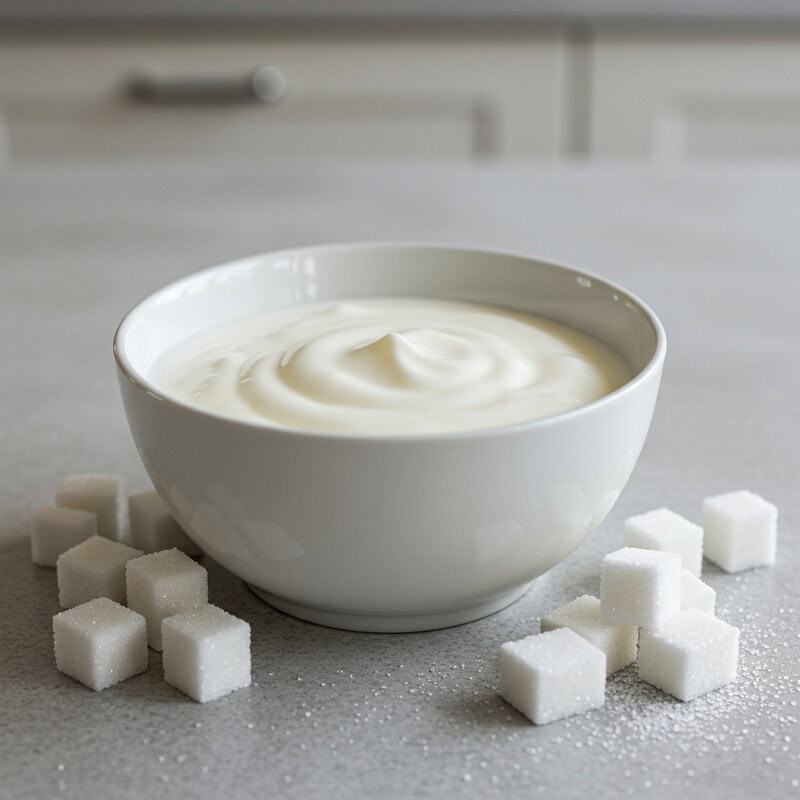
While organic yogurt is often marketed as a health food, many varieties contain significant amounts of added sugar to enhance flavor. These added sugars, even if organic, can drive inflammation in the body by increasing blood glucose and triggering the release of pro-inflammatory cytokines (NIH). Excess sugar intake has been linked to a higher risk of chronic inflammatory diseases such as type 2 diabetes, cardiovascular disease, and obesity. Organic added sugars, like organic cane sugar or agave syrup, are not less inflammatory than their conventional counterparts; the body processes them in the same way.
In contrast, unsweetened organic yogurt contains only the natural sugars found in milk (lactose) and beneficial probiotics, which can actually support gut health and reduce inflammation for many people. When choosing yogurt, always check the nutrition label for total and added sugars. Opting for plain, unsweetened varieties and adding fresh fruit or a drizzle of honey in moderation can help limit inflammation. For further reading on the impact of dietary sugars on inflammation, explore resources from the Harvard T.H. Chan School of Public Health.
4. Organic Agave Syrup
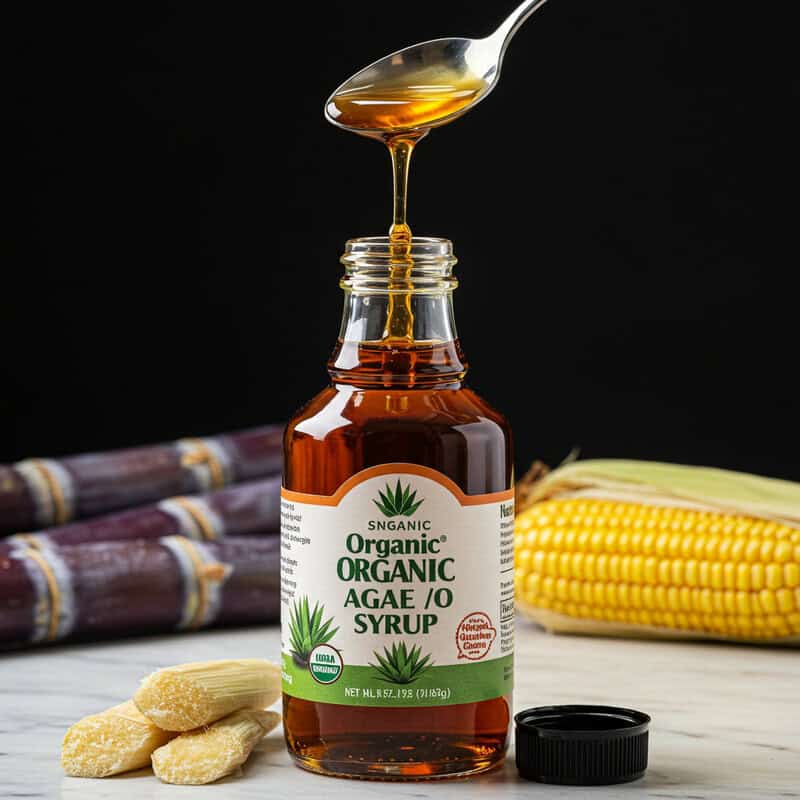
Organic agave syrup is widely promoted as a natural and healthier alternative to conventional sweeteners, yet its nutritional profile may pose significant inflammatory risks. The main concern is its exceptionally high fructose content—agave syrup can contain up to 85% fructose, much higher than table sugar (sucrose) or even high-fructose corn syrup (NIH). Excessive fructose is primarily metabolized by the liver, which can lead to fat accumulation, insulin resistance, and increased production of inflammatory compounds. Over time, these effects contribute to a higher risk of non-alcoholic fatty liver disease, metabolic syndrome, and chronic inflammation.
Compared to other sweeteners such as honey, maple syrup, or cane sugar, agave syrup’s high fructose content makes it a less favorable choice for those aiming to reduce inflammation. Even when labeled organic, agave syrup influences the body’s inflammatory pathways similarly to conventional fructose-rich sweeteners. To support better health, consider limiting your overall intake of added sugars and opting for sweeteners with lower fructose content. For more on the health impacts of fructose and sweetener choices, visit the Harvard Health Blog.
5. Organic Potato Chips

Organic potato chips may seem like a healthier snacking choice due to their natural ingredients and absence of synthetic pesticides, but the cooking process itself can create harmful, inflammatory compounds. When organic potatoes are fried at high temperatures, they produce acrylamide, a chemical linked to increased oxidative stress and inflammation in the body (National Cancer Institute). Acrylamide formation is not dependent on whether the potatoes are organic or conventional; it results from the reaction between sugars and an amino acid (asparagine) during frying.
Additionally, the oils used in frying—often vegetable or sunflower oils high in omega-6 fatty acids—can further contribute to the inflammatory potential of potato chips. Baked organic chips generally contain lower acrylamide levels due to less intense heat, but they can still be sources of unhealthy fats and added salt, both of which can exacerbate inflammation. For a less inflammatory snack, consider choosing baked over fried options and checking for minimal added oils and sodium on the ingredient list. For more about acrylamide and its health effects, refer to the FDA’s resources on acrylamide.
6. Organic Processed Meats

Organic processed meats, such as deli slices and sausages, are often perceived as healthier options due to their organic certification and absence of synthetic additives. However, these products frequently contain nitrates and nitrites—preservatives used to maintain color, flavor, and shelf life. Even when derived from “natural” sources like celery powder in organic products, these compounds can form nitrosamines during processing or cooking, which have been linked to increased inflammation and a higher risk of cancer, particularly colorectal cancer (American Cancer Society).
Research indicates that regular consumption of processed meats, regardless of organic status, is associated with chronic inflammation and other health risks (NIH). While organic regulations may restrict certain synthetic preservatives, they do not eliminate the risks posed by naturally occurring nitrates and the high sodium content typically found in these foods. To minimize inflammation and lower disease risk, it’s wise to reserve organic processed meats for occasional consumption and opt for minimally processed, nitrate-free alternatives when possible. For more information about the link between processed meats and cancer, visit the World Health Organization.
7. Organic Canola Oil

Organic canola oil is often marketed as a heart-healthy cooking oil, but its fatty acid profile can contribute to inflammation in some individuals. While canola oil does contain some omega-3 fatty acids, it is predominantly composed of omega-6 polyunsaturated fatty acids. Diets high in omega-6s, especially in relation to omega-3 intake, have been associated with increased levels of inflammatory markers within the body (NIH). The modern Western diet tends to have a much higher omega-6 to omega-3 ratio than is considered optimal for health, potentially fueling chronic inflammation.
In contrast, extra virgin olive oil contains mostly monounsaturated fats and a lower omega-6 content, while also supplying anti-inflammatory compounds like polyphenols. Research suggests that olive oil may help decrease inflammation and protect against cardiovascular disease (Harvard Health). If you are looking to minimize dietary inflammation, consider reducing your use of canola oil—even organic varieties—and replacing it with olive oil or other oils rich in omega-3s. Always review oil labels and aim for a balanced intake of healthy fats to support your body’s inflammatory response.
8. Organic Corn Tortilla Chips

Organic corn tortilla chips are a popular snack, but they can contribute to inflammation due to their high glycemic index and the oils used in their preparation. Corn chips, even when made from organic corn, are often fried in oils rich in omega-6 fatty acids, such as sunflower, safflower, or corn oil. High intake of omega-6s relative to omega-3s is linked to increased inflammation in the body (NIH). Additionally, the high glycemic index of corn chips means they can cause rapid spikes in blood sugar levels, which in turn triggers an inflammatory response (Harvard Health).
Frequent consumption of organic corn chips may therefore undermine efforts to lower inflammation, despite their natural and organic ingredients. For a healthier alternative, look for snacks made from whole grains, seeds, or legumes that are baked rather than fried, and prepared with oils lower in omega-6s, such as olive oil. Pairing snacks with fiber-rich vegetables or homemade dips can also help minimize blood sugar spikes and reduce the risk of inflammation.
9. Organic Soy Products

Organic soy products, including tofu, soy milk, and meat substitutes, are widely used as plant-based protein sources. However, soy contains phytoestrogens—plant compounds that mimic estrogen in the body—and anti-nutrients such as phytic acid and lectins. While phytoestrogens may have beneficial or neutral effects in moderation, excessive intake could disrupt hormonal balance and immune function in some individuals, potentially promoting inflammation (NIH). Anti-nutrients, meanwhile, can interfere with the absorption of minerals like calcium, iron, and zinc, and may cause digestive discomfort or inflammatory reactions in sensitive individuals.
There is also a distinction between whole and highly processed soy foods. Whole, minimally processed options such as edamame and traditional fermented soy (e.g., tempeh, miso) are generally better tolerated and may even provide anti-inflammatory benefits due to their nutrient and probiotic content. In contrast, processed organic soy products like soy burgers, nuggets, or bars often contain added sugars, preservatives, and concentrated soy protein isolates, all of which can increase their inflammatory potential. To reduce inflammation risk, focus on traditional or whole soy foods and limit intake of heavily processed soy-based products. Explore more about soy and health at the Harvard T.H. Chan School of Public Health.
10. Organic Fruit Juices

Organic fruit juices, though marketed as a natural and healthy beverage, can significantly contribute to inflammation due to their high concentration of sugars. Even when made from organic fruit, juices are stripped of most of their fiber during processing, resulting in a drink that delivers a rapid influx of fructose and glucose into the bloodstream. This sudden spike in blood sugar can trigger inflammatory pathways and, over time, increase the risk of metabolic disorders such as type 2 diabetes and obesity (Harvard T.H. Chan School of Public Health).
In contrast, eating whole fruits provides fiber, which slows the absorption of sugars and helps moderate the body’s glycemic response. Fiber also supports gut health and can reduce inflammation. Regularly consuming organic fruit juices, even with no added sugars, may still elevate inflammatory markers and undermine efforts to maintain a balanced diet. For a healthier approach, choose whole or minimally processed fruits instead of juice, or dilute juice with water to reduce its sugar content. For more information on the impact of fruit juices and recommendations for healthy beverage choices, read the CDC’s guidance on added sugars.
11. Organic Dried Fruit

Organic dried fruit is often seen as a nutritious snack, but it can be a hidden source of inflammation due to its high sugar concentration and, in some cases, the presence of sulfite additives. Drying fruit removes most of the water, concentrating natural sugars and significantly increasing the glycemic load with each serving. Consuming large amounts of dried fruit can lead to rapid spikes in blood sugar, which research has linked to increased inflammatory responses and metabolic stress (NIH).
Although organic regulations restrict synthetic additives, some organic dried fruits may still contain naturally derived sulfites to preserve color and extend shelf life. Sulfites can cause adverse reactions in sensitive individuals, including headaches and inflammation-related symptoms (FDA). To minimize the inflammatory impact, it’s important to practice portion control—stick to a small handful and balance dried fruit with protein or healthy fats to reduce blood sugar spikes. Whenever possible, choose unsweetened and unsulfured organic dried fruits, and consider enjoying fresh fruit as a lower-sugar, higher-fiber alternative. For guidance on healthy snacking, visit the Harvard T.H. Chan School of Public Health.
12. Organic Granola Bars
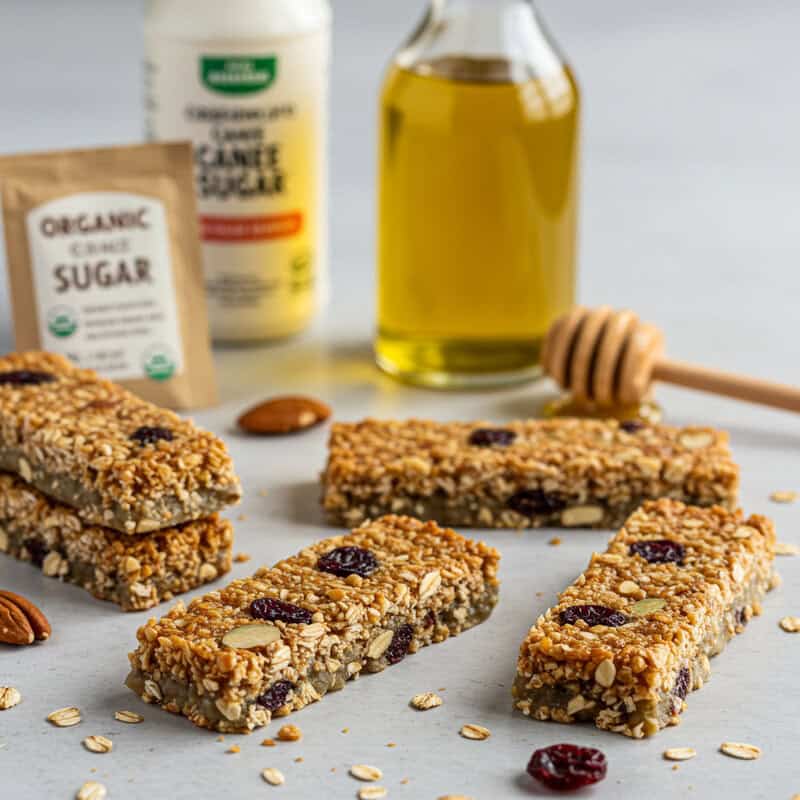
Organic granola bars are a convenient snack often marketed as wholesome and nutritious, but many contain hidden sugars and processed oils that can contribute to inflammation. Even when sweetened with organic cane sugar, brown rice syrup, or honey, these bars can contain significant amounts of added sugar. High sugar intake is linked to increased production of inflammatory cytokines and a greater risk of chronic diseases (NIH). Additionally, many organic granola bars include oils such as sunflower, safflower, or palm oil, all of which are high in omega-6 fatty acids, further tipping the body’s balance toward inflammation.
In comparison, homemade granola bars allow for greater control over ingredients. Using whole grains, seeds, nuts, and natural binders like nut butter, you can limit added sugars and unhealthy fats. Incorporating anti-inflammatory ingredients such as chia seeds, flaxseeds, and dried berries can further boost the health benefits. If purchasing packaged options, look for bars with minimal added sugars (less than 5 grams per serving) and healthier fats. For more information on reading labels and choosing healthy snacks, consult the FDA’s Nutrition Facts Label guide.
13. Organic Ice Cream

Organic ice cream is a tempting treat that avoids synthetic additives and hormones, but it still contains high levels of saturated fat and added sugar, both of which can promote inflammation. Saturated fats, found abundantly in dairy-based ice cream, have been associated with greater production of pro-inflammatory molecules in the body and a higher risk of cardiovascular disease when consumed in excess (Harvard T.H. Chan School of Public Health). The sugar content in organic ice cream is also significant, contributing to blood sugar spikes and inflammatory responses (NIH).
Alternatives such as sorbet and frozen yogurt might appear to be healthier, but they often contain similar amounts of sugar and, in the case of frozen yogurt, may also include dairy and sweeteners. Sorbet is typically dairy-free but can be almost pure sugar, offering little nutritional benefit. For a less inflammatory dessert, consider options made with whole fruit, lower sugar content, or plant-based ingredients. Always review nutrition labels and practice moderation, regardless of whether a product is labeled organic. For tips on making healthier dessert choices, visit CDC: Know Your Limit for Added Sugars.
14. Organic Nut Butters with Added Oils

Organic nut butters are often chosen for their perceived purity and nutritional value, but many varieties contain added oils that can increase inflammation. Commonly used oils such as sunflower, safflower, or palm oil are high in omega-6 fatty acids, which can disrupt the body’s omega-6 to omega-3 balance and promote inflammatory processes when consumed in excess (NIH). Even though these oils may be organic, their impact on inflammation is similar to that of conventional oils.
Reading ingredient labels is critical for identifying nut butters with minimal additives. Ideally, organic nut butter should contain just nuts (and possibly a small amount of salt), with no added oils or sugars. Added sweeteners and salt can further compound the inflammatory effects, especially when combined with processed oils. Opting for products labeled “no added oils” or making your own nut butter at home ensures greater control over what you’re consuming. For more guidance on choosing healthier spreads and interpreting food labels, visit the FDA’s Nutrition Facts Label guide. Prioritizing simple ingredient lists is a key step in reducing potential dietary inflammation.
15. Organic Pasta

Organic pasta is a staple in many kitchens, often chosen for its lack of synthetic pesticides and additives. However, when made from refined grains, organic pasta can still spike blood sugar levels and contribute to inflammation. The refining process removes the bran and germ from wheat, stripping away fiber and essential nutrients. As a result, refined organic pasta is digested quickly, leading to rapid increases in blood glucose and insulin, which are known to trigger inflammatory pathways in the body (NIH).
Whole grain pasta, whether organic or conventional, retains more fiber, vitamins, and minerals, leading to a slower rise in blood sugar and a lower glycemic index. Numerous studies link higher whole grain intake to reduced inflammation and a lower risk of chronic diseases (Harvard T.H. Chan School of Public Health). When selecting pasta, check labels for “whole wheat” or “whole grain” as the first ingredient. Limiting portion sizes and pairing pasta with fiber-rich vegetables, healthy fats, and lean proteins can further reduce its inflammatory impact and support overall metabolic health.
16. Organic Maple Syrup
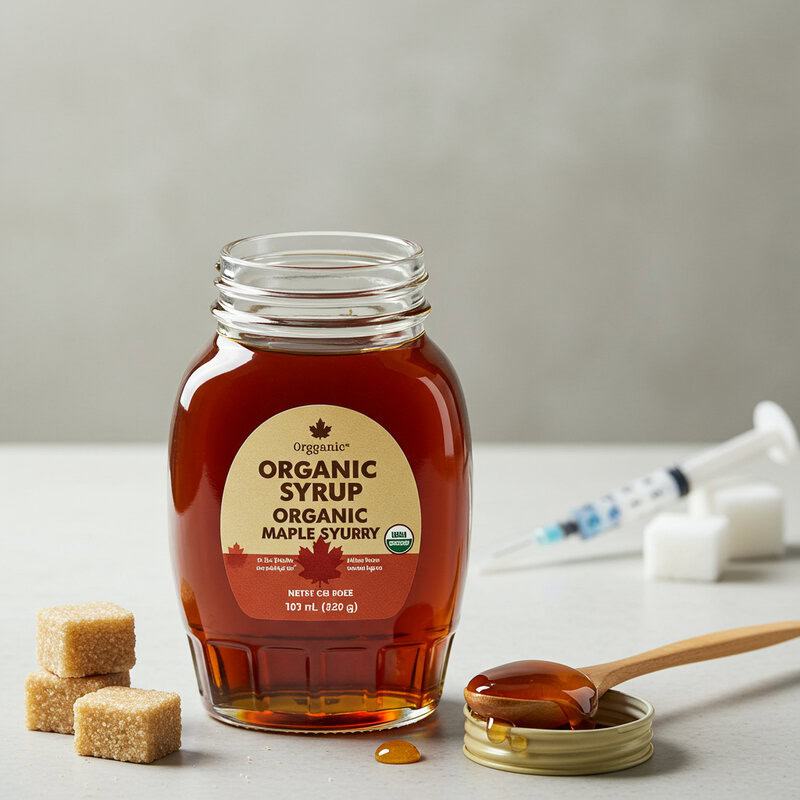
Organic maple syrup is often considered a wholesome, natural sweetener, but its high natural sugar content can still contribute to inflammation when consumed in excess. Maple syrup is primarily composed of sucrose, a type of sugar that the body rapidly absorbs, leading to spikes in blood glucose and insulin. These spikes can activate inflammatory pathways and increase the risk of metabolic issues such as obesity, type 2 diabetes, and cardiovascular disease (NIH).
Although maple syrup contains small amounts of minerals and antioxidants, these benefits are outweighed by the large quantities of sugar present in typical servings. The inflammatory response caused by frequent sugar consumption is similar whether the source is organic maple syrup, honey, or table sugar. To support overall health and minimize inflammation, it is important to use maple syrup sparingly and be mindful of total daily sugar intake. Opt for naturally sweet foods, such as fresh fruit, to satisfy sweet cravings more healthfully. For more information about the effects of added sugars and recommendations for healthy consumption, visit the CDC’s guide on added sugars.
17. Organic Cheese
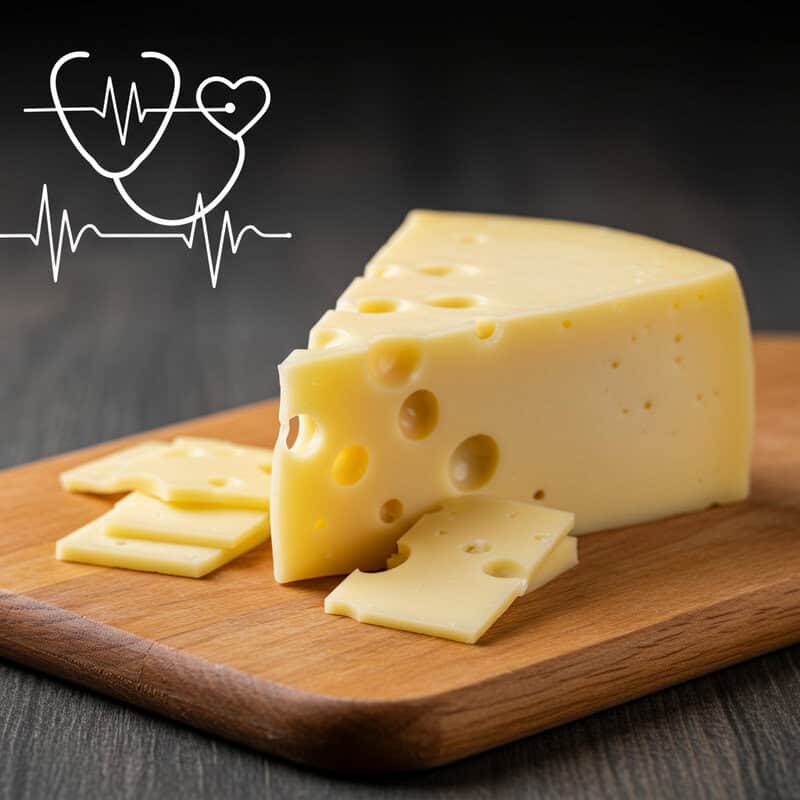
Organic cheese is made without synthetic additives or pesticides, but it can still be a significant source of saturated fat, casein, and sodium—all of which can contribute to inflammation and impact cardiovascular health. Saturated fat, abundant in most cheeses, is associated with higher levels of LDL cholesterol and increased risk of heart disease when consumed in large amounts (Harvard T.H. Chan School of Public Health). The inflammatory effects of saturated fat are not reduced by organic production methods.
Casein, the main protein in cheese, may provoke an immune response in individuals with dairy sensitivities, potentially leading to symptoms such as joint pain, digestive upset, or skin problems (NIH). Furthermore, cheese is typically high in sodium, which can increase blood pressure and exacerbate cardiovascular and inflammatory conditions, regardless of whether the cheese is organic or conventional.
For those concerned about inflammation or heart health, it is wise to moderate cheese intake and explore lower-sodium, plant-based, or reduced-fat alternatives. Always check nutrition labels for saturated fat and sodium content, even on organic varieties. For more on cheese and heart health, visit the American Heart Association.
18. Organic Flavored Almond Milk

Organic flavored almond milk is a popular dairy alternative, but it often contains added sugars and stabilizing gums that can contribute to inflammation. Many flavored varieties, such as vanilla or chocolate, include significant amounts of organic cane sugar or other sweeteners, which can cause blood sugar spikes and activation of inflammatory pathways in the body (Harvard T.H. Chan School of Public Health). The presence of added sugars makes these beverages less healthy than their unsweetened counterparts, especially when consumed regularly.
Additionally, organic almond milk may contain gums like carrageenan, guar gum, or gellan gum to improve texture and shelf life. While these additives are generally recognized as safe, some studies suggest that certain gums, especially carrageenan, may trigger gut inflammation or digestive discomfort in sensitive individuals (NIH). In comparison, unsweetened organic almond milk contains little to no sugar and often has fewer additives, making it a preferable choice for those aiming to minimize inflammation. When shopping, check the ingredient list and nutrition label, and select unsweetened varieties for a healthier, lower-inflammatory option.
19. Organic Rice Crackers

Organic rice crackers are often marketed as a light and healthy snack, but they can provoke rapid blood sugar spikes due to their high glycemic index. Even though they’re made with organic rice and contain no artificial additives, the refining process strips away most of the grain’s fiber and nutrients. This leaves a product that is quickly digested and absorbed, causing sharp increases in blood glucose and insulin levels (Harvard Health).
Frequent consumption of high-glycemic foods like rice crackers has been linked to increased risk factors for type 2 diabetes, obesity, and chronic inflammation (NIH). The absence of fiber in most rice crackers means they do little to slow sugar absorption or promote satiety, which can also contribute to overeating. Choosing whole grain snacks, such as whole grain crackers, popcorn, or raw vegetables, provides more fiber and nutrients while minimizing blood sugar spikes and inflammation. For those managing or hoping to prevent diabetes and inflammatory conditions, it’s important to moderate or avoid refined, high-glycemic snacks—even if they bear an organic label.
20. Organic Coconut Oil
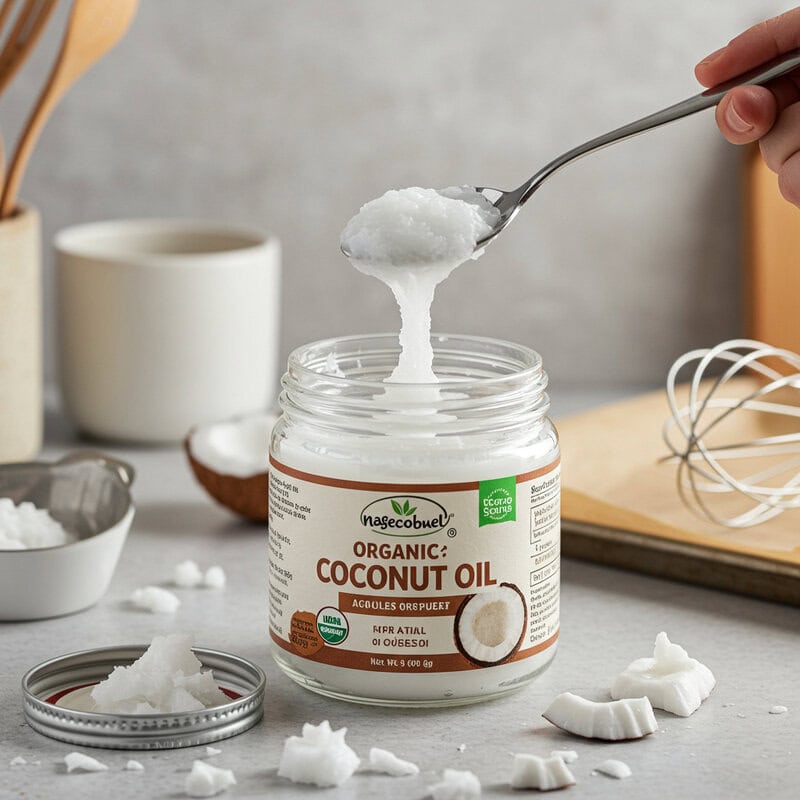
Organic coconut oil has gained popularity as a natural alternative for cooking and baking, but it is composed of about 90% saturated fat, a concentration even higher than butter. Saturated fats can raise LDL (“bad”) cholesterol levels, which is associated with an increased risk of cardiovascular disease and inflammation (Harvard T.H. Chan School of Public Health). While some proponents claim that the medium-chain triglycerides (MCTs) in coconut oil are metabolized differently and may have beneficial effects, large-scale studies have not consistently confirmed anti-inflammatory or heart-protective benefits.
The debate around coconut oil’s inflammatory potential centers on the type of saturated fats it contains and how these interact with other dietary factors. Despite its organic status and unique fatty acid profile, coconut oil can still increase markers of inflammation and cholesterol in susceptible individuals, particularly when consumed in large quantities (NIH). For those concerned about inflammation or heart health, it’s advisable to use coconut oil sparingly and favor oils with proven anti-inflammatory properties, such as extra virgin olive oil. Moderation and variety in fat sources are key to a balanced, inflammation-conscious diet.
21. Organic Trail Mix with Sweets
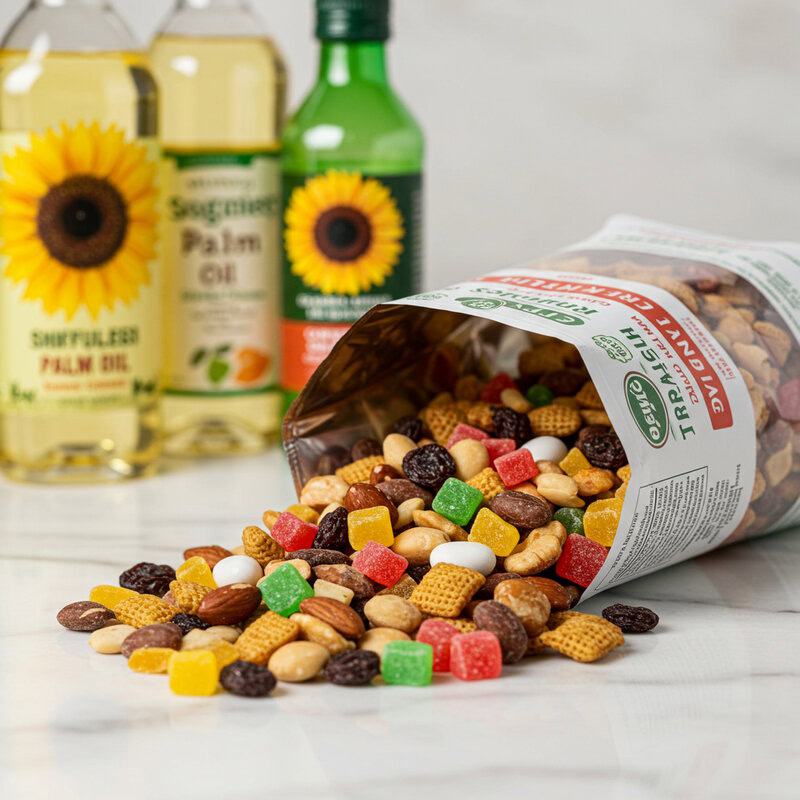
Organic trail mix featuring sweets—such as chocolate chips, yogurt-covered raisins, or candied fruit—can be deceptively inflammatory. While the base of nuts and seeds is nutritious, the added sugars from sweets quickly increase the glycemic load and can provoke blood sugar spikes, leading to the release of pro-inflammatory cytokines (NIH). Additionally, some organic trail mixes include added oils (such as sunflower or palm oil) to enhance flavor or prolong shelf life. These oils are often high in omega-6 fatty acids, which, when consumed in excess, may further promote inflammation (NIH).
For a less inflammatory snack, consider making your own trail mix at home. Combine raw or dry-roasted unsalted nuts, seeds, and a small portion of unsweetened dried fruit. Avoid mixes with chocolate candies, sweetened coconut, or processed coatings. Making your own blend allows for total ingredient control and the ability to manage both sugar and unhealthy fat content. Always check store-bought labels for added sugars, oils, and sodium. For additional guidance, see the Harvard T.H. Chan School of Public Health’s snacking tips.
22. Organic Gummy Candy

Organic gummy candies are often marketed as a better alternative to conventional sweets, but they still contain high levels of sugar and gelatin, which can contribute to inflammation and other health concerns. These candies are typically made with organic cane sugar, fruit juice concentrates, or syrup, all of which cause rapid increases in blood glucose. High sugar intake has been linked to elevated risk of metabolic syndrome, type 2 diabetes, and chronic inflammation (Harvard T.H. Chan School of Public Health).
The sticky, chewy nature of gummy candy also poses risks for dental health. Sugars in these candies can cling to teeth, feeding harmful bacteria and leading to tooth decay and gum inflammation (CDC). While gelatin itself is not inflammatory for most people, it does not offset the health effects of high sugar content. For better metabolic and oral health, it’s best to limit gummy candies—even those labeled organic—and choose naturally sweet snacks like whole fruits. Practicing good oral hygiene and mindful eating can help reduce both inflammatory and dental risks.
23. Organic Breakfast Cereal

Organic breakfast cereals are often positioned as a healthy and convenient way to start the day, but many varieties contain refined grains and added sugars that can drive inflammation. Even with the organic label, cereals made from refined wheat, corn, or rice are rapidly digested, resulting in blood sugar spikes and subsequent inflammatory responses (NIH). The addition of organic cane sugar, honey, or brown rice syrup further compounds this effect, increasing the risk of metabolic syndrome and chronic disease over time.
In contrast, oatmeal—especially when made from whole rolled oats or steel-cut oats—retains its fiber and nutrients, which slow carbohydrate absorption and help moderate blood sugar levels. Oatmeal is also rich in beta-glucans, compounds shown to reduce inflammation and support heart health (Harvard T.H. Chan School of Public Health). For a healthier breakfast, choose organic cereals with whole grains listed as the first ingredient and less than 5 grams of added sugar per serving, or opt for homemade oatmeal with fresh fruit and nuts to further limit inflammation and support overall wellness.
24. Organic Vegan Cheese

Organic vegan cheese is a popular alternative for those avoiding dairy, but many varieties are highly processed and contain refined oils and additives that may promote inflammation. Common ingredients include organic coconut oil, sunflower oil, and starches, which are used to mimic the texture and mouthfeel of traditional cheese. These oils, particularly when rich in saturated fat or omega-6 fatty acids, can contribute to pro-inflammatory effects if consumed regularly (NIH).
In addition to oils, organic vegan cheeses often contain thickeners and emulsifiers such as tapioca starch, carrageenan, or guar gum. While generally recognized as safe, some research suggests certain additives, like carrageenan, may cause gut inflammation or digestive distress in sensitive individuals (NIH). For a less inflammatory option, consider minimally processed spreads made from nuts or seeds, such as cashew cheese made with whole-food ingredients. Always review ingredient lists, and limit vegan cheese products that rely heavily on processed oils and additives. For more on the link between processed foods and inflammation, refer to the Harvard T.H. Chan School of Public Health.
25. Organic Ketchup
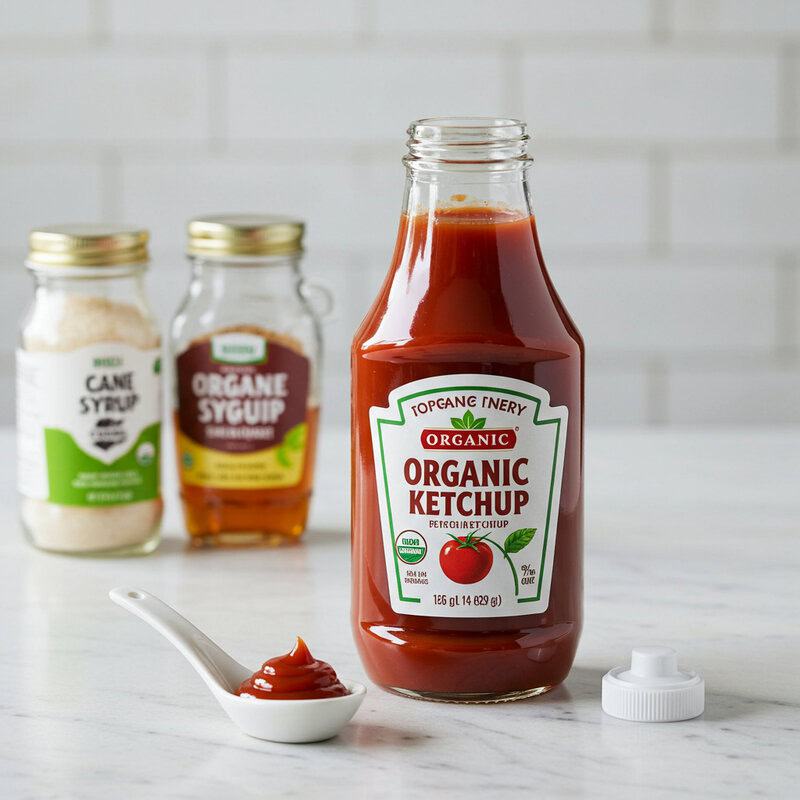
Organic ketchup is a staple condiment in many households, prized for its natural ingredients and lack of synthetic pesticides or high-fructose corn syrup. However, even organic varieties are often high in added sugars, such as organic cane sugar or agave syrup. These sugars can cause rapid blood sugar spikes, triggering inflammatory pathways and increasing the risk of chronic conditions over time (Harvard T.H. Chan School of Public Health). Some organic ketchups may also include natural preservatives or concentrates that, while less artificial, do not eliminate the potential for inflammation.
Comparatively, homemade sauces made from fresh tomatoes, herbs, and spices allow for full control over sugar and salt content, resulting in a fresher taste and a lower risk of provoking inflammation. By limiting or omitting added sugars and unnecessary additives, homemade tomato sauces can support a more balanced, anti-inflammatory diet. When purchasing ketchup, check ingredient labels for total sugar content and opt for brands with minimal added sugars or, better yet, try making your own. For more information on reducing sugar intake and making healthier condiment choices, visit the CDC’s guide on added sugars.
26. Organic Sports Drinks
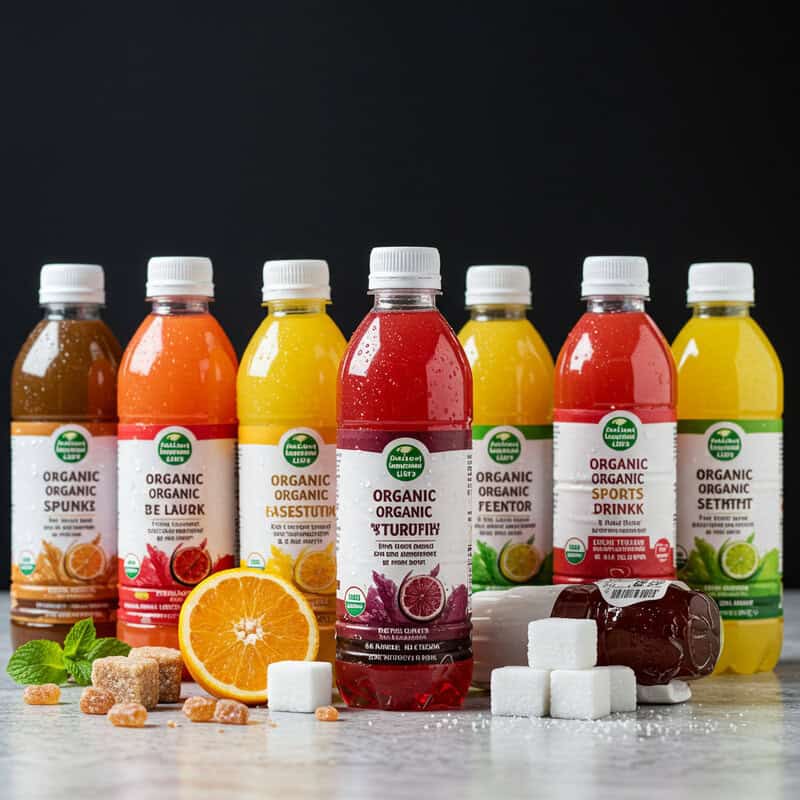
Organic sports drinks are often marketed to health-conscious consumers as better choices for hydration and electrolyte replenishment, but they still frequently contain added sugars and natural flavors that can contribute to inflammation. While these drinks may avoid artificial colors and synthetic preservatives, the sugar content can be comparable to that of conventional sports drinks. Consuming beverages with high levels of sugar, even if organic, can cause spikes in blood glucose and insulin, activating inflammatory responses and potentially increasing the risk of obesity, type 2 diabetes, and other chronic diseases (Harvard T.H. Chan School of Public Health).
In addition to sugars, some organic sports drinks include “natural flavors” or organic fruit concentrates, which add to the overall sugar load without providing significant nutritional benefits. For most people, plain water or water infused with fresh fruit and a pinch of sea salt is sufficient for hydration, even after moderate exercise. For intense or prolonged activity, coconut water or homemade electrolyte drinks with minimal added sugars are healthier alternatives. For more information on hydration and limiting sugary beverages, visit the CDC’s Healthy Beverage Choices.
27. Organic Flavored Popcorn
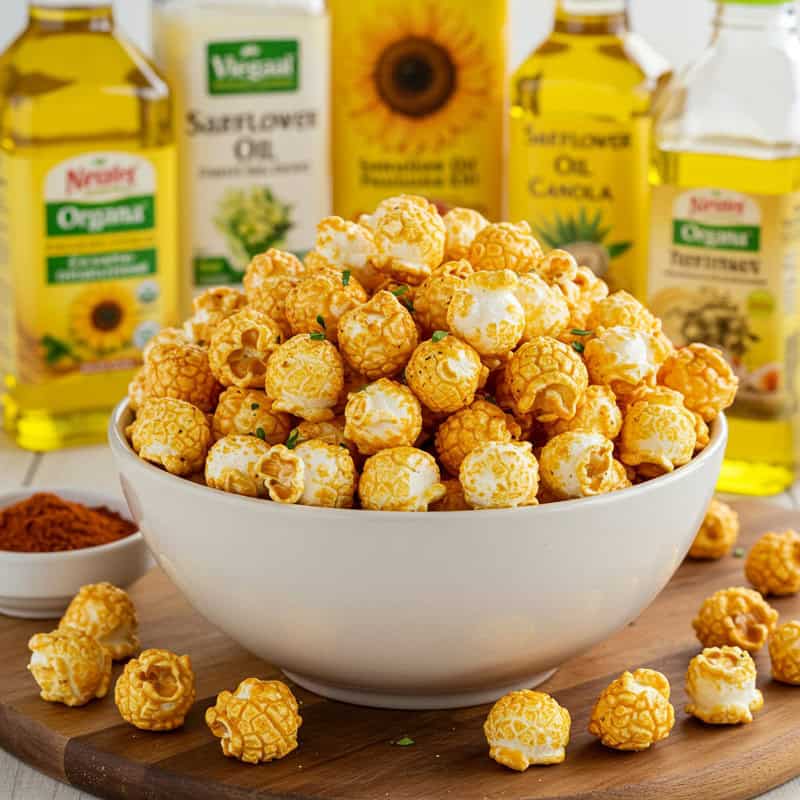
Organic flavored popcorn is a popular snack, but it can be a surprising source of inflammation due to its use of processed oils and artificial or natural flavorings. Many pre-packaged organic popcorn varieties are popped in oils high in omega-6 fatty acids, such as sunflower, safflower, or canola oil. Consuming these oils in large amounts, especially relative to omega-3 intake, is associated with increased inflammatory markers in the body (NIH). Additionally, flavored varieties often contain additives, salt, and sweeteners, all of which can contribute to inflammation when eaten regularly.
For a healthier alternative, air-popped popcorn made at home is a better choice. You can control the ingredients, avoid excess oils, and add flavor with anti-inflammatory spices such as turmeric, black pepper, or nutritional yeast. When purchasing pre-packaged options, check labels for the type of oil used, sodium content, and the presence of artificial or “natural” flavorings. For more tips on making healthy snack choices and understanding the impact of processed oils, visit the Harvard T.H. Chan School of Public Health’s snack guide.
28. Organic Energy Bars
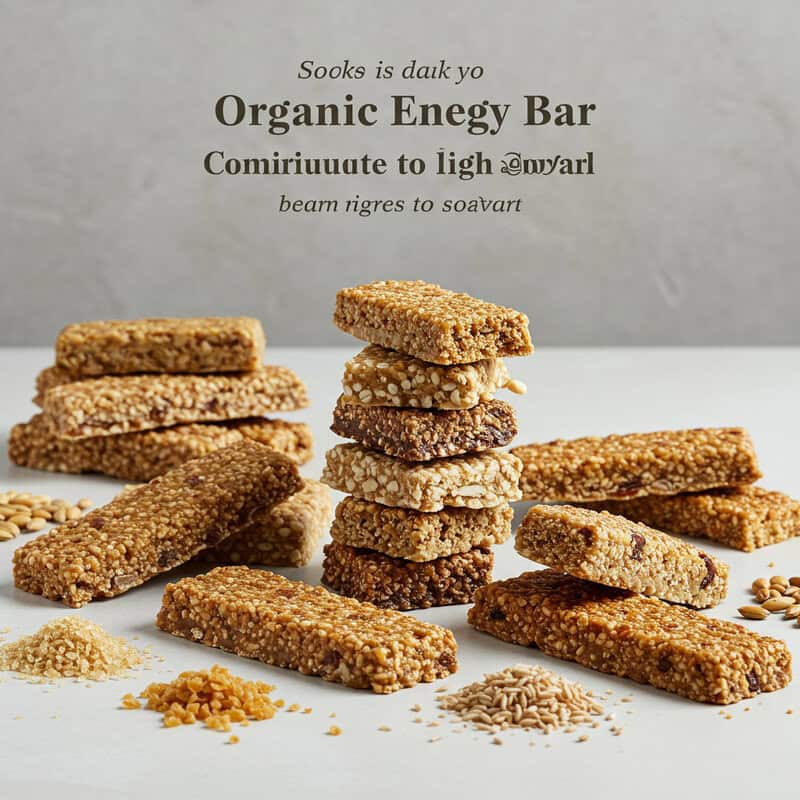
Organic energy bars are designed for convenience and quick nutrition, but many are packed with added sugars and processed ingredients that can contribute to inflammation. Even when sweetened with organic cane sugar, brown rice syrup, or agave, these bars often contain sugar levels that rival candy bars. Consistent intake of high-sugar foods can spike blood glucose, increase inflammatory markers, and raise the risk of metabolic syndrome and related diseases (NIH).
Furthermore, organic energy bars frequently include processed protein isolates, refined grains, and oils high in omega-6 fatty acids, such as sunflower or safflower oil. These ingredients, while organic, are highly processed and may disrupt the body’s natural inflammatory balance. Careful label reading is essential: Choose bars with whole food ingredients like nuts, seeds, and dried fruit, and look for those with less than 5 grams of added sugar per serving. For a truly anti-inflammatory snack, consider making your own bars at home using oats, nut butter, and natural sweeteners in moderation. For more on reading food labels and making healthy choices, visit the FDA’s Nutrition Facts Label guide.
29. Organic Soy Sauce

Organic soy sauce is a staple condiment in many kitchens, often valued for its savory flavor and organic ingredients. However, it remains exceptionally high in sodium, with just one tablespoon delivering up to 900 milligrams—about 40% of the recommended daily limit. High sodium intake is strongly associated with increased blood pressure and can trigger inflammatory responses in the body, contributing to cardiovascular disease and other chronic conditions (CDC).
Additionally, the fermentation process used to produce soy sauce generates a range of byproducts, including certain amines and histamines. In sensitive individuals, these compounds may provoke headaches, allergic reactions, or gastrointestinal discomfort, all of which can be linked to inflammatory pathways (NIH). While organic soy sauce avoids synthetic additives and genetically modified soybeans, its sodium content and fermentation byproducts can still pose health risks. To reduce inflammation, limit soy sauce use, opt for lower-sodium varieties, or try alternative flavorings like coconut aminos with reduced sodium. For more information on sodium and inflammation, visit the CDC’s sodium resource page.
30. Organic Muffins

Organic muffins are often marketed as wholesome or nutritious, but many store-bought varieties contain substantial amounts of added sugars and refined flours. Even with organic ingredients, these muffins typically rely on white flour and sweeteners such as organic cane sugar or agave syrup to achieve their taste and texture. High intake of refined carbohydrates and sugars has been linked to elevated blood glucose, insulin spikes, and increased inflammatory markers in the body (NIH).
These inflammatory effects can be compounded by the lack of dietary fiber and nutrients in most conventional organic muffins. In contrast, homemade muffins can be crafted with whole grain flours, nuts, seeds, and limited natural sweeteners, offering more fiber and micronutrients to help moderate blood sugar levels and reduce inflammation. To make healthier muffins at home, incorporate ingredients like oat flour, almond meal, grated vegetables, or fruit, and use minimal added sugars. Always check store-bought muffin labels for total sugar and fiber content. For more healthy baking tips and guidance on reducing added sugar, visit the Harvard T.H. Chan School of Public Health’s healthy baking guide.
31. Organic Fruit Snacks
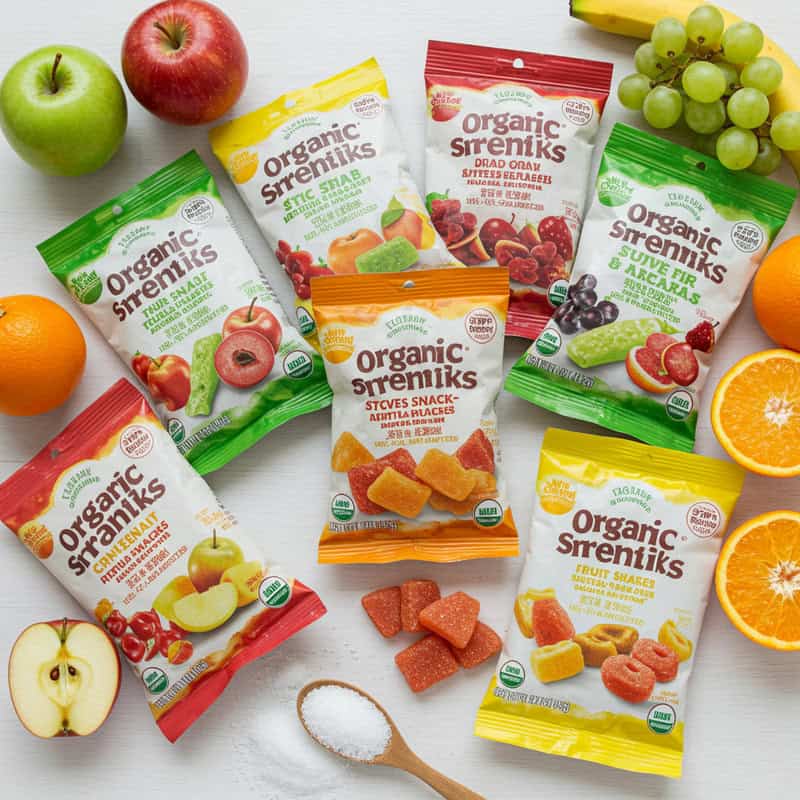
Organic fruit snacks are frequently marketed as a healthy option for children and adults, but they often contain concentrated sugars and additives that can promote inflammation. These snacks are typically made from fruit juice concentrates, purees, or added organic sugars, which strip away the beneficial fiber present in whole fruit. As a result, consuming organic fruit snacks can cause rapid blood sugar spikes, contributing to elevated inflammatory markers and increasing the risk of metabolic issues over time (Harvard T.H. Chan School of Public Health).
In addition to sugar, many organic fruit snacks contain additives for color, flavor, and texture, such as natural flavors, citric acid, or pectin. While these are generally considered safe, excessive consumption of processed snacks can displace more nutrient-dense whole foods in the diet. To minimize inflammation, practice portion control—limit fruit snacks to small servings and enjoy them only occasionally. Whenever possible, opt for real fruit, which provides fiber, vitamins, minerals, and antioxidants. For more tips on choosing healthy snacks and understanding ingredient labels, see the FDA’s Nutrition Facts Label guide.
32. Organic Mayonnaise
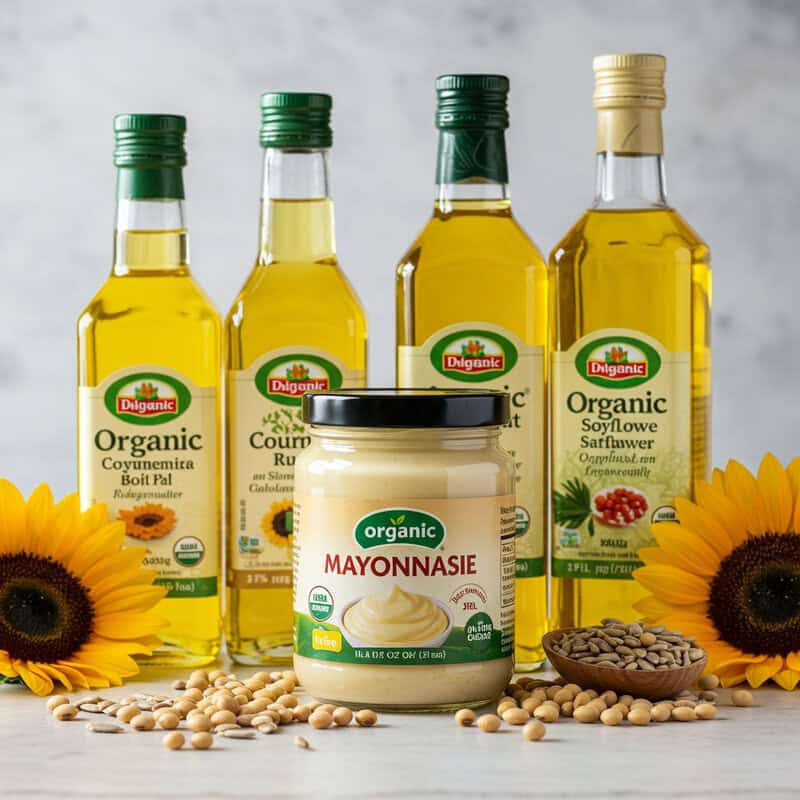
Organic mayonnaise is often made with seemingly wholesome ingredients, but it typically contains large amounts of omega-6-rich oils such as organic soybean, sunflower, or safflower oil. These oils, while organic, are high in linoleic acid, an omega-6 fatty acid that, when consumed in excess relative to omega-3s, can promote the production of pro-inflammatory molecules in the body (NIH). The modern Western diet is already skewed toward an excess of omega-6 fatty acids, which has been implicated in increased levels of chronic inflammation and related diseases.
Additionally, organic mayonnaise may contain natural preservatives like vinegar or citric acid to extend shelf life. While these are generally recognized as safe, they do not mitigate the potential inflammatory effects of the oil base. For those looking to reduce dietary inflammation, opt for mayonnaise made with olive or avocado oil, or try making homemade versions with anti-inflammatory ingredients. Always check ingredient labels and be mindful of portion sizes, as even small servings can add up to significant omega-6 intake. For more on the connection between fats, inflammation, and health, visit the Harvard T.H. Chan School of Public Health’s guide to dietary fats.
33. Organic Instant Oatmeal
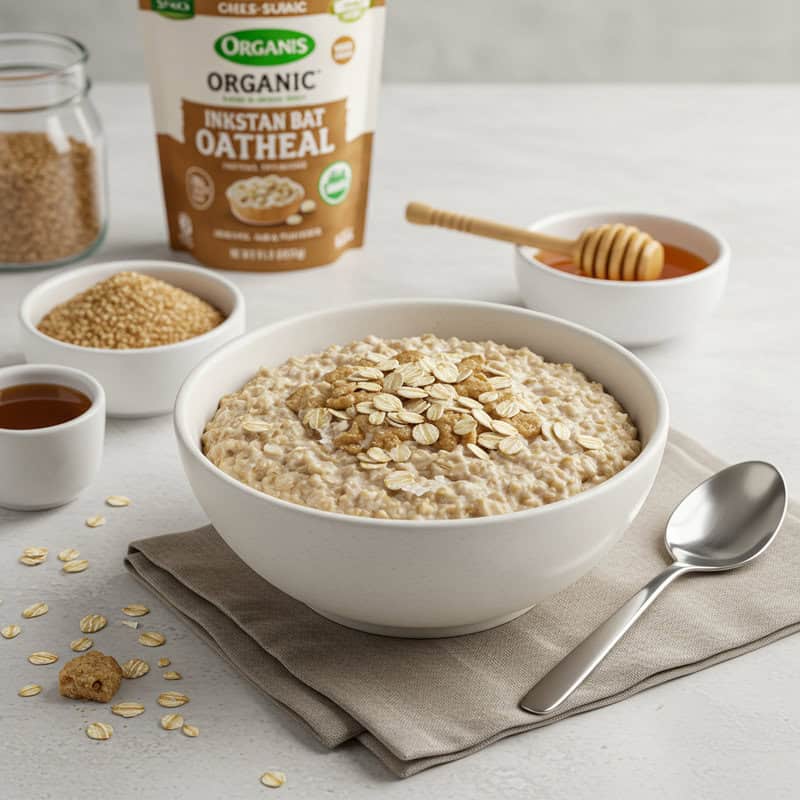
Organic instant oatmeal offers a convenient breakfast option, but many flavored varieties contain added sugars and artificial or natural flavorings that can promote inflammation. Even when labeled organic, these sugars—often in the form of organic cane sugar, honey, or syrups—can cause rapid spikes in blood glucose, leading to increased production of inflammatory cytokines and a higher risk of metabolic disorders (Harvard T.H. Chan School of Public Health).
In addition to added sugars, organic instant oatmeal may include flavorings, thickeners, and preservatives that can detract from the nutritional quality of the meal. Frequent consumption of these processed options may displace healthier choices and contribute to chronic inflammation. In contrast, plain rolled oats or steel-cut oats are minimally processed, contain no added sugar, and are rich in fiber and antioxidants shown to reduce inflammation and support heart health (Harvard T.H. Chan School of Public Health). For a healthier bowl, prepare plain oats and add fresh fruit, nuts, or spices such as cinnamon for natural sweetness and flavor, keeping inflammation in check.
34. Organic Salad Dressings

Organic salad dressings may seem like a healthy addition to your greens, but many bottled options contain processed oils and added sugars that can contribute to inflammation. Commonly used oils in organic dressings—such as sunflower, safflower, or soybean oil—are high in omega-6 fatty acids, which, when consumed in excess, can promote the production of pro-inflammatory compounds in the body (NIH). Even organic dressings may contain added sugars, often in the form of cane sugar, honey, or agave syrup, which can spike blood glucose and activate inflammatory pathways (Harvard T.H. Chan School of Public Health).
For a more anti-inflammatory option, consider making your own salad dressing at home. Use extra virgin olive oil, which is rich in monounsaturated fats and anti-inflammatory polyphenols, combined with vinegar or lemon juice and fresh herbs. DIY dressings give you full control over ingredients and allow you to avoid unnecessary sugars and processed oils. Always check ingredient lists on bottled dressings, even organic varieties, for added sugars and unhealthy fats. For healthy dressing ideas and tips, visit the Academy of Nutrition and Dietetics’ guide to homemade dressings.
35. Organic Barbecue Sauce
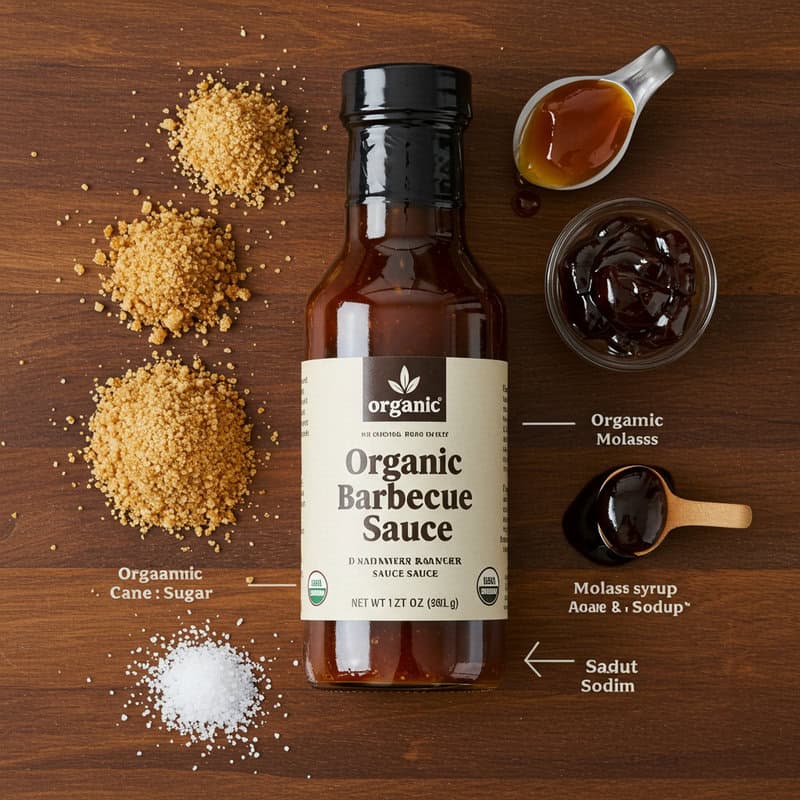
Organic barbecue sauce is a popular condiment for grilling and dipping, but it often contains high levels of sugar and sodium, both of which can contribute to inflammation. Even though the sugars—such as organic cane sugar, molasses, or agave syrup—are organic, they still cause rapid blood sugar spikes, which can activate inflammatory pathways and increase the risk of metabolic disorders over time (Harvard T.H. Chan School of Public Health). Sodium is another concern, as most barbecue sauces are heavily salted to enhance flavor and preserve freshness. High sodium intake is associated with increased blood pressure and inflammation, regardless of whether the source is organic or conventional (CDC).
For a healthier alternative, consider making your own barbecue sauce at home using tomato paste, vinegar, spices, and a modest amount of natural sweetener. This allows you to control both the sugar and sodium content while still enjoying rich flavor. Always check labels on store-bought sauces for added sugars and sodium levels, and use in moderation. For more healthy condiment recipes and tips, visit the Academy of Nutrition and Dietetics’ guide to healthy sauces.
36. Organic Crackers

Organic crackers are often chosen for their natural ingredients and absence of artificial additives, but many brands are primarily made from refined grains and contain high levels of sodium. Even when labeled organic, crackers made with white flour or rice flour are quickly digested, leading to rapid increases in blood sugar and triggering inflammatory responses (NIH). These effects are compounded by the addition of salt, which is commonly used to enhance flavor and preserve freshness. Excessive sodium intake is associated with increased blood pressure and inflammation, irrespective of organic status (CDC).
For a healthier and less inflammatory snack, choose crackers made with whole grains, seeds, or legumes, which provide more fiber and nutrients to help moderate blood sugar. Additionally, look for products with lower sodium content or make your own crackers at home using wholesome ingredients. Pairing crackers with hummus, fresh vegetables, or nut butter can further boost their nutritional value. For more ideas on healthy snacks and how to read labels, explore the Harvard T.H. Chan School of Public Health’s snack guide.
37. Organic Pickles

Organic pickles are a tangy addition to meals and snacks, but they can be surprisingly high in sodium and may contain preservatives—even when labeled organic. The pickling process relies heavily on salt to preserve the cucumbers and enhance flavor. Consuming pickles regularly can contribute to excessive sodium intake, which has been linked to increased blood pressure and the activation of inflammatory pathways in the body (CDC). While organic pickles typically avoid synthetic additives, some varieties may still use natural preservatives, such as vinegar or citric acid, to extend shelf life.
For a healthier option, consider choosing naturally fermented pickles that rely on lactic acid fermentation rather than added vinegar or excessive salt. Fermented pickles provide beneficial probiotics that can support gut health and may help reduce inflammation in some individuals (NIH). When shopping, read ingredient labels to check sodium content and avoid products with unnecessary additives. Making your own pickles at home allows for better control over salt and ingredients, offering a fresher, more nutritious alternative. Moderation is key, even with organic and fermented varieties.
38. Organic Chocolate Bars

Organic chocolate bars are often perceived as a healthier indulgence due to their natural ingredients and absence of synthetic additives. However, many varieties are high in added sugars and saturated fat, which can contribute to inflammation when consumed in excess. The sugar content in organic milk chocolate bars is typically similar to that of conventional options, leading to blood sugar spikes and the activation of pro-inflammatory pathways (Harvard T.H. Chan School of Public Health).
In addition to sugar, organic chocolate bars often contain cocoa butter, a source of saturated fat, which can raise LDL cholesterol and increase cardiovascular and inflammatory risks, especially if eaten frequently (Harvard T.H. Chan School of Public Health). For a less inflammatory alternative, choose dark chocolate with at least 70% cocoa content and minimal added sugar. Dark chocolate is richer in antioxidants and contains less sugar and saturated fat, offering potential heart and anti-inflammatory benefits when eaten in moderation. Always check ingredient labels and portion sizes, even for organic products, to support a balanced and health-conscious diet.
39. Organic Flavored Rice Cakes
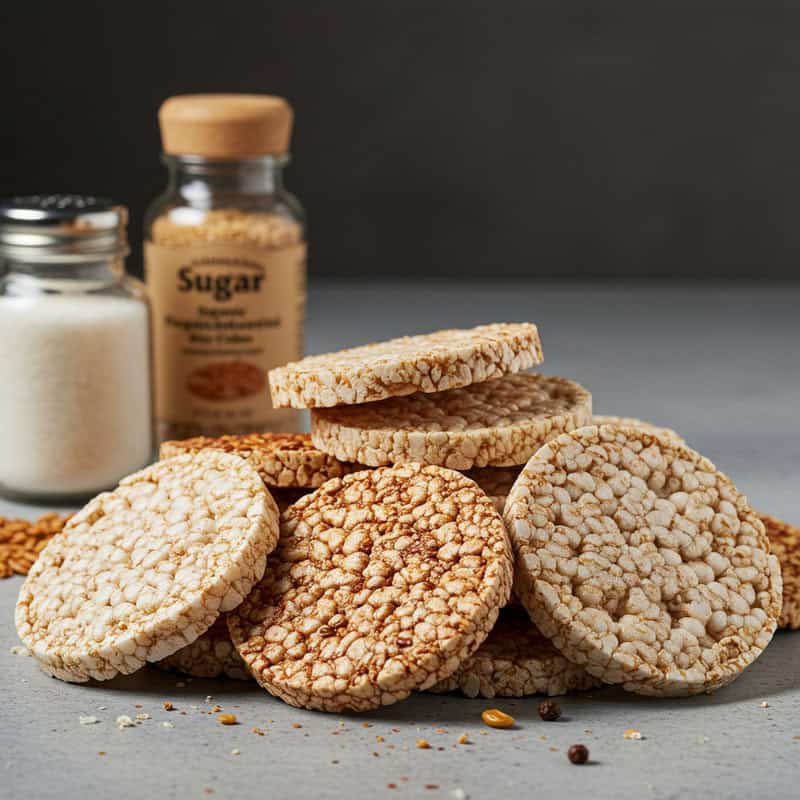
Organic flavored rice cakes are often marketed as a light and healthy snack, but they can harbor flavoring agents, added sugars, and sodium that contribute to inflammation. The base ingredient, white rice, is rapidly digested and has a high glycemic index, leading to quick spikes in blood glucose and subsequent inflammatory responses (Harvard Health). Flavored varieties often contain additional ingredients such as sweeteners, artificial or “natural” flavors, and salt, which may further increase their inflammatory potential.
While plain organic rice cakes are free from most additives, they still lack fiber and nutrients, resulting in a similar glycemic impact to white bread or crackers. Regular consumption of high-glycemic foods is linked to an increased risk of inflammation, type 2 diabetes, and metabolic syndrome (NIH). For a healthier snack, choose plain rice cakes and pair them with nutrient-dense toppings like nut butter, avocado, or hummus to slow sugar absorption and add beneficial fats and fiber. Always check ingredient labels to avoid unwanted flavoring agents and excess sodium in packaged rice cakes.
40. Organic Frozen Pizza

Organic frozen pizza is a convenient comfort food, but it often contains ingredients that can promote inflammation. Many brands use refined flour for the crust, which is quickly digested and leads to spikes in blood sugar—an effect associated with increased inflammatory markers and higher risk of chronic disease (NIH). Toppings such as processed meats (organic pepperoni or sausage) often contain natural nitrates and high levels of sodium, both of which are linked to inflammation and cardiovascular risk (American Cancer Society).
Additionally, generous amounts of organic cheese add saturated fat and more sodium, further compounding the inflammatory potential. While the organic label may ensure fewer synthetic additives, it does not mitigate the effects of refined grains, processed meats, or high saturated fat. For a healthier pizza option, consider making your own at home using whole grain crust, plenty of vegetables, lean proteins, and moderate cheese. This approach provides greater control over ingredients and nutritional content. For more ideas on healthy homemade meals, visit the Harvard T.H. Chan School of Public Health’s Healthy Eating Plate.
41. Organic Honey
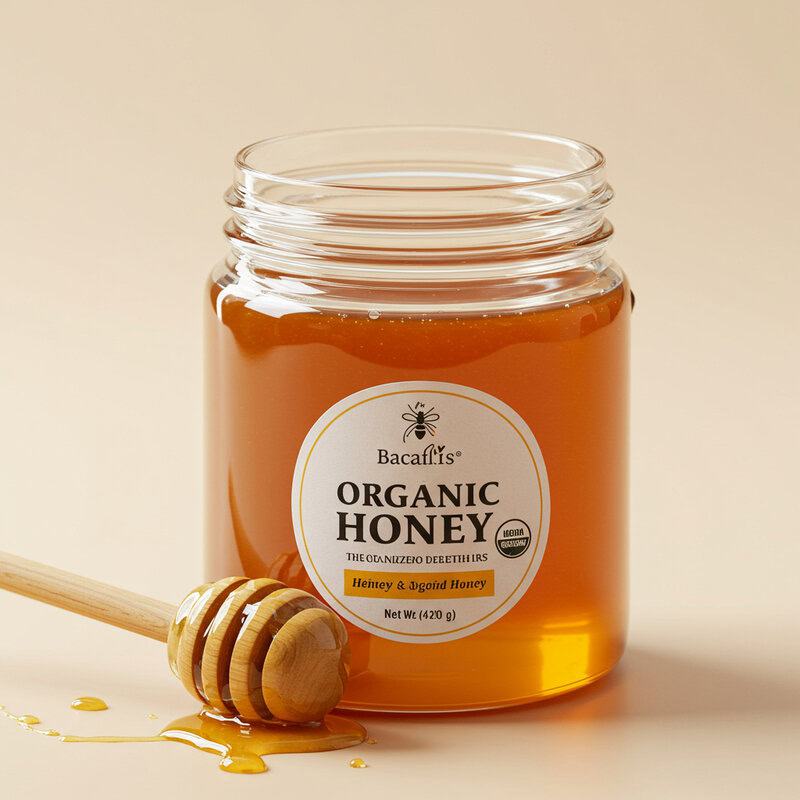
Organic honey is often viewed as a natural and healthful sweetener, but it is still primarily composed of fructose and glucose, similar to other forms of sugar. While honey contains trace amounts of antioxidants, vitamins, and minerals, its high sugar content can contribute to rapid blood glucose spikes and activate inflammatory pathways in the body, especially when consumed in large amounts (Harvard T.H. Chan School of Public Health). Research suggests that diets high in added sugars, including honey, are linked to increased risks of obesity, type 2 diabetes, and chronic inflammation (NIH).
To minimize the potential inflammatory effects, it is important to use honey sparingly and be mindful of total daily sugar intake from all sources. Whenever possible, satisfy sweet cravings with whole fruits, which offer fiber and a range of beneficial phytonutrients. If you do use honey, opt for raw, organic varieties and limit servings to small amounts. For more information on added sugars and guidelines for healthy consumption, visit the CDC’s added sugars resource.
42. Organic Tofu with Additives
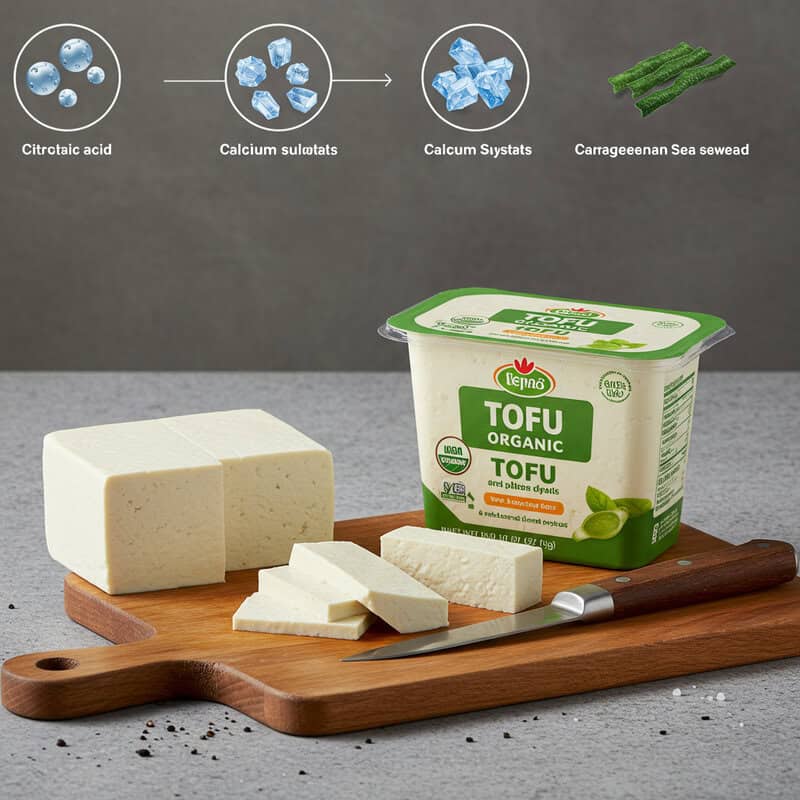
Organic tofu is generally considered a healthy, plant-based protein source, but some packaged varieties include preservatives and flavorings that can undermine its anti-inflammatory benefits. Flavored or pre-marinated organic tofu may contain ingredients such as citric acid, calcium sulfate, carrageenan, or natural flavors. While these additives help extend shelf life and enhance taste, certain preservatives and thickening agents, like carrageenan, have been linked to digestive irritation and may stimulate inflammatory responses in sensitive individuals (NIH).
In contrast, plain organic tofu typically contains only soybeans, water, and a coagulant (such as calcium sulfate or magnesium chloride), offering a minimally processed, high-protein option that is less likely to trigger inflammation. To maximize the health benefits of tofu, choose plain varieties and add your own herbs and spices at home for flavor. Always check ingredient labels for unnecessary additives, especially if you have a sensitive digestive system or are prone to food sensitivities. For more information on reading food labels and selecting minimally processed products, visit the FDA’s Nutrition Facts Label guide.
43. Organic Sourdough Bread

Organic sourdough bread is often praised for its traditional preparation and lack of artificial additives, but it still contains gluten and fermentation byproducts that may trigger inflammation in sensitive individuals. The sourdough fermentation process can partially break down gluten and phytic acid, making the bread easier to digest for some. However, those with celiac disease or non-celiac gluten sensitivity may still experience inflammatory reactions due to the presence of gluten proteins (Celiac Disease Foundation).
Fermentation produces organic acids and compounds such as histamines, which can affect digestive health. While many people benefit from the enhanced digestibility and unique flavor of sourdough, others may experience bloating, discomfort, or headaches—symptoms linked to histamine sensitivity or gluten intolerance (NIH). It’s important to recognize that organic certification does not eliminate these potential issues. If you notice digestive symptoms after eating organic sourdough, consider tracking your intake and consulting a healthcare professional. For those with sensitivities, gluten-free or low-histamine bread options may offer a more comfortable and anti-inflammatory alternative.
44. Organic Plant-Based Meats

Organic plant-based meats are increasingly popular among those seeking to reduce animal product consumption, but many contain highly processed ingredients, flavor enhancers, and refined oils. Ingredients such as organic pea protein isolate, rice protein, and potato starch are used to mimic the texture of meat but undergo extensive processing that can strip away fiber and micronutrients. These products often include oils high in omega-6 fatty acids, such as sunflower or canola oil, which, when consumed in excess, have been linked to increased inflammation (NIH).
Recent studies suggest that highly processed plant-based meat alternatives may have a similar inflammatory potential as traditional processed meats, particularly when they contain additives like methylcellulose, flavorings, and excess sodium (NIH). While organic certification ensures the absence of synthetic pesticides and GMOs, it does not reduce the inflammatory impact of processed ingredients and oils. For a less inflammatory approach, focus on whole-food plant proteins such as lentils, beans, chickpeas, and tofu. For more information on how to choose minimally processed plant-based foods, refer to the Harvard T.H. Chan School of Public Health’s healthy protein guide.
45. Organic BBQ Chips
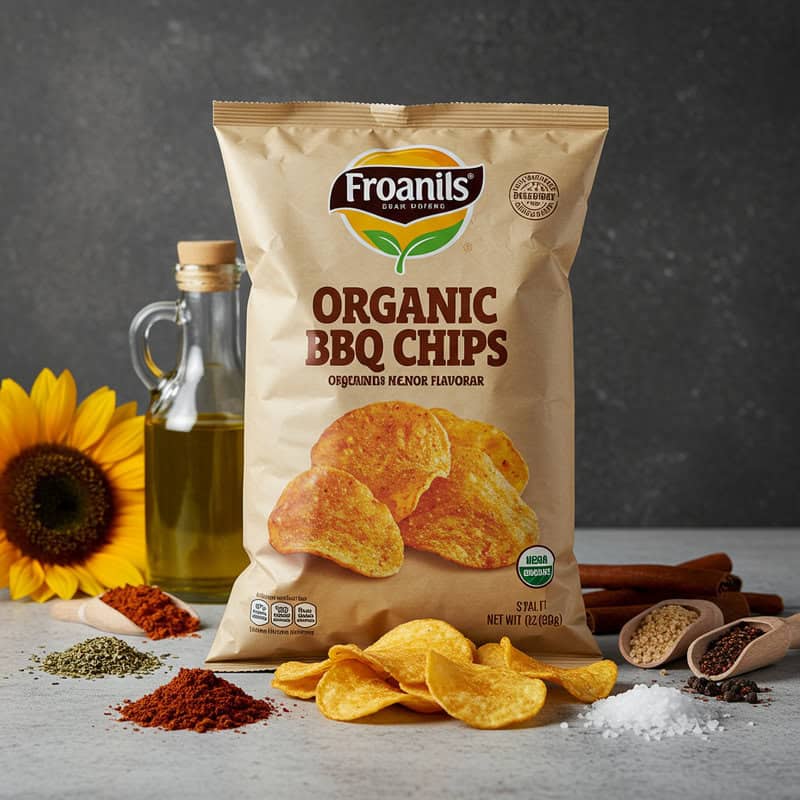
Organic BBQ chips are a popular snack, but their seemingly healthier label does not eliminate the potential for inflammation. These chips are typically fried in oils high in omega-6 fatty acids, such as sunflower or safflower oil, which can promote inflammation when consumed in excess (NIH). The BBQ flavoring is often achieved through a blend of spices, salt, organic sugar, and natural smoke flavor, all of which can contribute to higher sodium and sugar content.
Another concern is the formation of acrylamide, a chemical produced when starchy foods like potatoes are cooked at high temperatures during frying or baking. Acrylamide has been associated with increased oxidative stress and inflammation, and its presence is not reduced by organic certification (National Cancer Institute). Even though organic BBQ chips avoid synthetic additives and GMOs, the combination of processed oils, added sugars, high sodium, and acrylamide formation makes them a less healthy snack choice. For a more anti-inflammatory option, consider air-popped popcorn with homemade spice blends or baked vegetable chips with minimal oil and salt.
46. Organic Frozen Meals

Organic frozen meals provide convenience but can still be significant contributors to inflammation due to their high sodium content, preservatives, and frequent reliance on refined grains. Many organic frozen entrees use white rice, pasta, or breading made from refined flour, which is digested quickly and can spike blood sugar, triggering inflammatory responses (NIH). Sodium is often used liberally to enhance flavor and preserve food freshness, with some meals providing more than half the daily recommended limit in a single serving (CDC).
While organic certification limits synthetic additives, natural preservatives such as citric acid or vinegar may still be present. The combination of high sodium, refined grains, and preservatives can undermine the intended health benefits and promote chronic inflammation when consumed regularly. For a healthier alternative, prepare meals at home using whole grains, fresh vegetables, lean proteins, and herbs for flavor. Batch-cooking and freezing individual portions can provide the same convenience as store-bought frozen meals while giving you full control over sodium, additives, and ingredient quality. For guidance on healthy meal preparation, visit the Harvard Healthy Eating Plate.
47. Organic Fruit Preserves
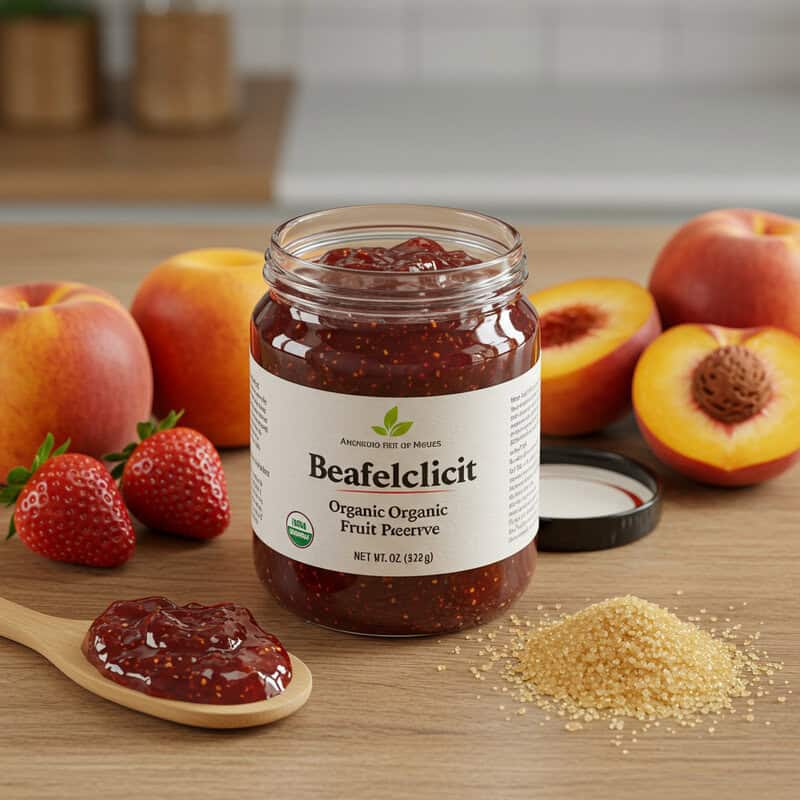
Organic fruit preserves, including jams and jellies, are commonly made with organic fruit and organic cane sugar. Despite their natural origins, these spreads contain concentrated sugars that can quickly elevate blood glucose and activate inflammatory pathways. The process of making preserves reduces fruit to a thick, sweet spread, often requiring significant amounts of sugar to achieve the desired texture and shelf life (Harvard T.H. Chan School of Public Health). Even though the sugars are organic, their metabolic effects are virtually identical to conventional sugars.
Consuming organic fruit preserves in large amounts or as a frequent topping can contribute to chronic inflammation and increase the risk of metabolic disorders, such as obesity and type 2 diabetes (NIH). To minimize inflammatory impact, use fruit preserves sparingly—opt for a thin layer on whole grain toast, or pair with protein-rich foods like yogurt or nut butter to slow sugar absorption. Choosing preserves labeled “low sugar” or “fruit-only” can also help reduce your overall sugar intake. For more information on managing portion sizes and sugar intake, consult the CDC’s added sugars guide.
48. Organic Hazelnut Spread
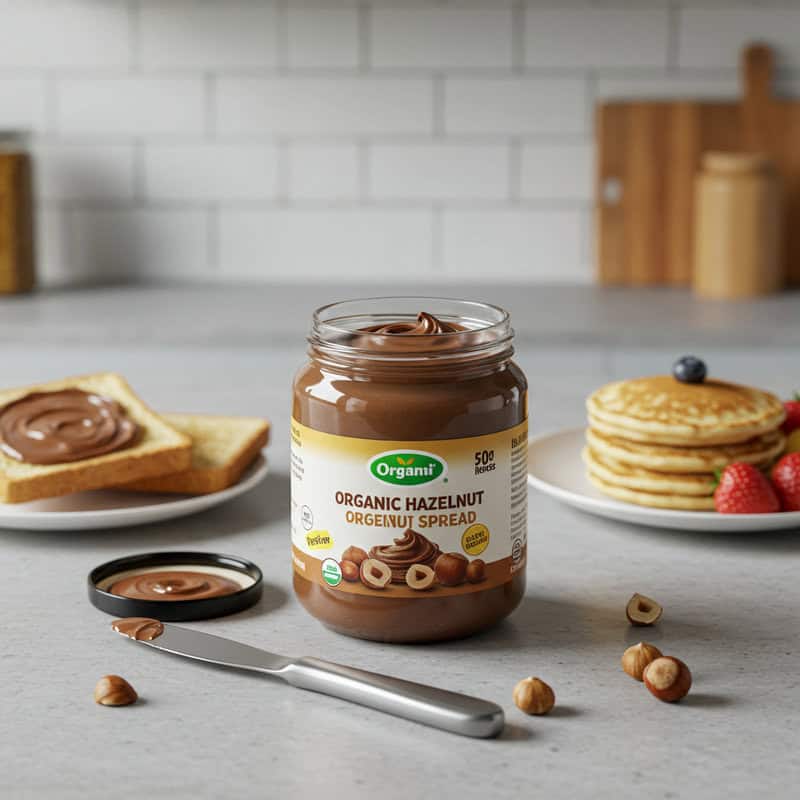
Organic hazelnut spreads are a popular treat, often enjoyed on toast, pancakes, or fruit. However, most commercial varieties are high in added sugars and palm oil, which can promote inflammation when consumed regularly. While the organic label ensures that the ingredients are free from synthetic pesticides and GMOs, it does not alter the metabolic impact of these components. Added sugars in hazelnut spreads can cause rapid blood sugar spikes, increasing inflammatory markers and raising the risk of obesity and metabolic syndrome (Harvard T.H. Chan School of Public Health).
Palm oil, even when organic, is high in saturated fat, which has been linked to higher levels of LDL cholesterol and inflammation in the body (Harvard T.H. Chan School of Public Health). For a healthier alternative, consider making your own hazelnut spread at home using roasted hazelnuts, a small amount of cocoa, and a natural sweetener like dates or a touch of honey. This approach allows you to control the sugar and fat content while maximizing nutritional value. Always check labels for sugar and oil content before purchasing commercial spreads.
49. Organic Meat Substitutes with Wheat Gluten
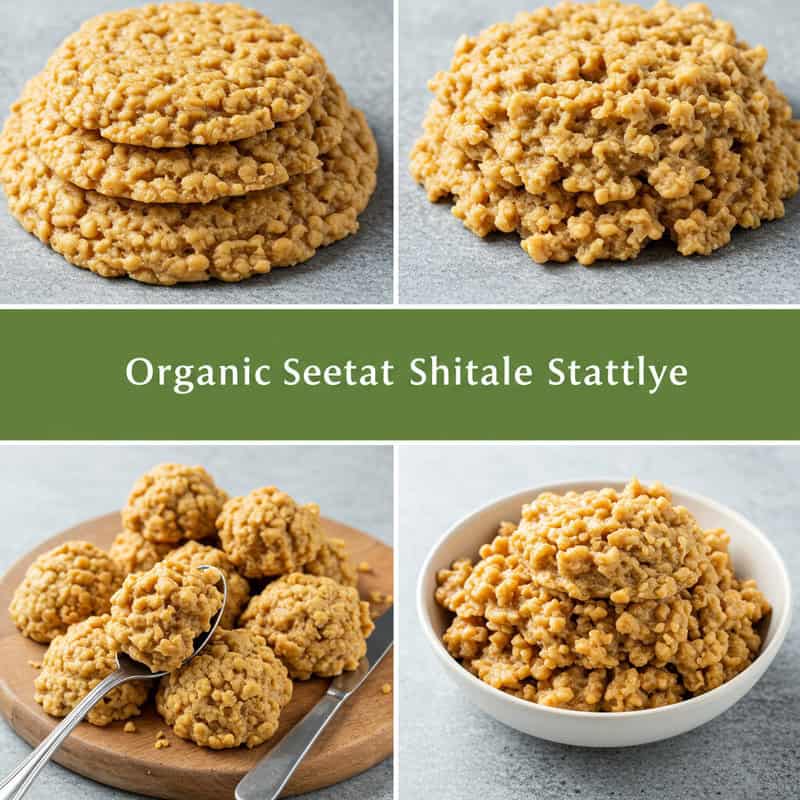
Organic meat substitutes that use wheat gluten—commonly known as seitan—are popular among vegetarians and vegans for their high protein content and meat-like texture. However, these products can be highly processed and contain concentrated gluten, which may trigger inflammation in individuals with celiac disease, non-celiac gluten sensitivity, or certain autoimmune conditions (Celiac Disease Foundation). Even for those without diagnosed gluten issues, a diet high in processed wheat gluten may contribute to digestive discomfort or low-grade inflammation in sensitive individuals (NIH).
In addition to gluten, many organic meat substitutes include additives, flavorings, and binding agents that further increase their processed nature. While these products can offer convenience and variety, they may lack the fiber, vitamins, and phytonutrients found in whole plant foods. For a less inflammatory and more nutrient-dense diet, focus on whole food protein sources such as beans, lentils, tofu, tempeh, and legumes. These options are minimally processed and provide a broader range of nutrients to support overall health. For more on plant-based proteins and healthy eating, visit the Harvard T.H. Chan School of Public Health.
50. Organic Sweetened Tea
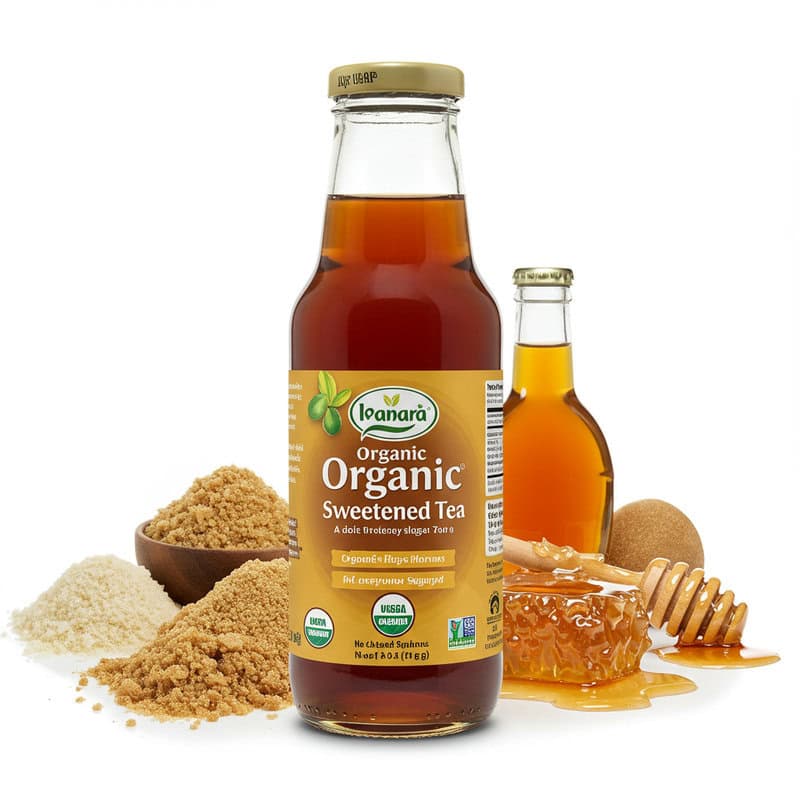
Organic sweetened tea is a popular beverage, but it can contribute to inflammation due to its added sugar content and, in some cases, higher caffeine levels. Many bottled or ready-to-drink organic teas contain significant amounts of organic cane sugar, honey, or agave syrup, which can cause rapid increases in blood glucose and activate inflammatory pathways (Harvard T.H. Chan School of Public Health). Regular consumption of sugary drinks is linked to a higher risk of obesity, type 2 diabetes, and chronic inflammation (CDC).
Caffeine, while not inherently inflammatory for most people, can contribute to dehydration if consumed in large amounts and may exacerbate symptoms in individuals sensitive to its effects. For optimal hydration and to reduce inflammation risk, consider unsweetened alternatives such as plain brewed tea, herbal infusions, or simply water infused with fresh fruit or herbs. These options offer flavor without added sugars or excessive caffeine. Always check nutrition labels on bottled teas for sugar content, and aim to limit or avoid sweetened beverages as part of an anti-inflammatory diet. For more hydration tips, visit the CDC’s Healthy Beverage Choices.
Conclusion
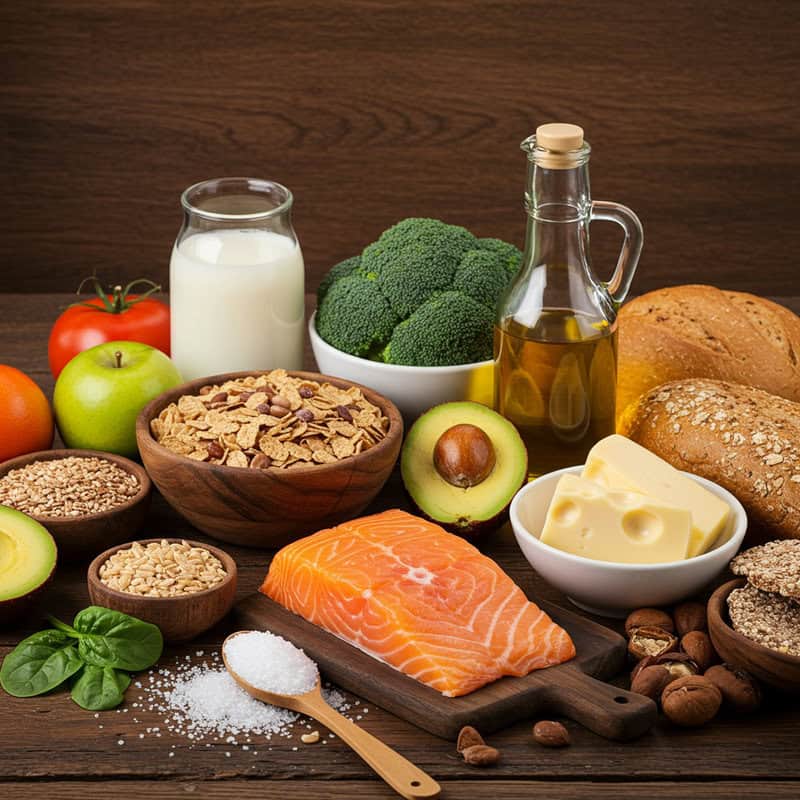
Choosing organic foods is a positive step for many, but it’s essential to remember that the organic label does not guarantee a food is anti-inflammatory. Many organic products still contain sugars, refined grains, unhealthy fats, and additives that can contribute to inflammation. Reading ingredient labels, understanding nutrition facts, and making informed choices are crucial for maintaining long-term health. Regular check-ups with your healthcare provider and mindful dietary habits can help identify foods that may be problematic for your unique needs. For more resources on healthy eating and label reading, visit the FDA’s Nutrition Facts Label guide and the Harvard T.H. Chan School of Public Health.
Disclaimer
The information provided in this article is for general informational purposes only. While we strive to keep the information up-to-date and correct, we make no representations or warranties of any kind, express or implied, about the completeness, accuracy, reliability, suitability, or availability with respect to the article or the information, products, services, or related graphics contained in the article for any purpose. Any reliance you place on such information is therefore strictly at your own risk.
In no event will we be liable for any loss or damage including without limitation, indirect or consequential loss or damage, or any loss or damage whatsoever arising from loss of data or profits arising out of, or in connection with, the use of this article.
Through this article you are able to link to other websites which are not under our control. We have no control over the nature, content, and availability of those sites. The inclusion of any links does not necessarily imply a recommendation or endorse the views expressed within them.
Every effort is made to keep the article up and running smoothly. However, we take no responsibility for, and will not be liable for, the article being temporarily unavailable due to technical issues beyond our control.





